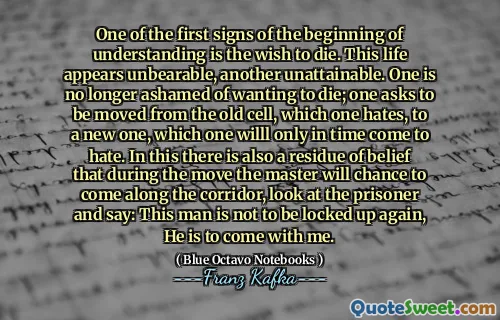The man in ecstasy and the man drowning-both throw up their arms.
Franz Kafka, in *Blue Octavo Notebooks*, presents a compelling analogy between two distinct human experiences: ecstasy and despair. The imagery of both the ecstatic man and the drowning man throwing up their arms symbolizes a universal response to extreme emotions. In moments of profound joy or desperation, people instinctively seek help or express their feelings through this shared gesture, illustrating how transcendent experiences can evoke similar reactions, despite their contrasting natures. This quote underscores the complexity of human emotion, suggesting that even in moments of great contrast, such as happiness and suffering, there remains a commonality in the human experience. Kafka invites readers to reflect on how we react to life's intense moments—whether we are reaching out for joy or in need of rescue. Ultimately, the throw of the arms serves as a powerful visual metaphor for our desire to connect and communicate, despite the circumstances that separate our experiences.
Franz Kafka, in *Blue Octavo Notebooks*, presents a compelling analogy between two distinct human experiences: ecstasy and despair. The imagery of both the ecstatic man and the drowning man throwing up their arms symbolizes a universal response to extreme emotions. In moments of profound joy or desperation, people instinctively seek help or express their feelings through this shared gesture, illustrating how transcendent experiences can evoke similar reactions, despite their contrasting natures.
This quote underscores the complexity of human emotion, suggesting that even in moments of great contrast, such as happiness and suffering, there remains a commonality in the human experience. Kafka invites readers to reflect on how we react to life's intense moments—whether we are reaching out for joy or in need of rescue. Ultimately, the throw of the arms serves as a powerful visual metaphor for our desire to connect and communicate, despite the circumstances that separate our experiences.






